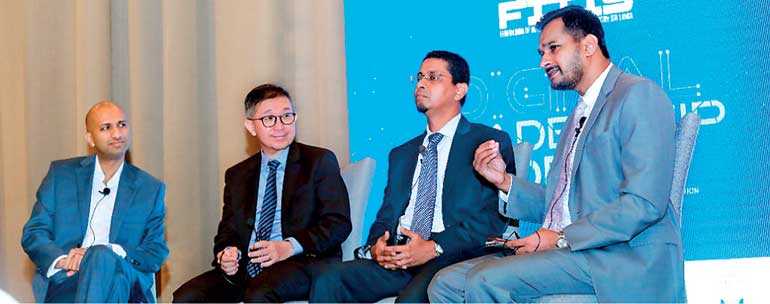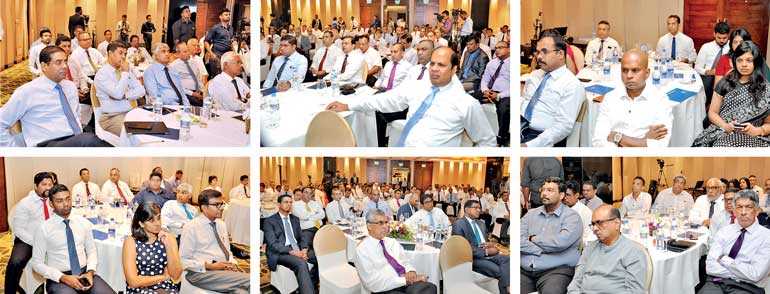Saturday Feb 21, 2026
Saturday Feb 21, 2026
Friday, 18 October 2019 00:00 - - {{hitsCtrl.values.hits}}


Ernst & Young (EY) ASEAN Advisory Leader Chow Sang Hoe, addressing C-Suite business leaders as the keynote speaker at the Digital Leadership Forum of FITIS at the Hilton, Colombo on 16 October, stated: “In an era of digital Darwinism, after years playing around the edges of digital transformation, the world’s biggest companies are ramping up their game – investment in digital technology is expected to reach a mega $ 2 trillion by 2022.”
 |
Ernst & Young ASEAN and Malaysia Managing Partner Chow Sang Hoe |
 |
FITIS Chairman and Debug Group Managing Director Abbas Kamrudeen |
Global technology innovations can push for transformation possibilities and drive new business ventures.
Inertia leads to extinction. Standing still is not an option for developing and emerging markets. Hence, South Asian countries such as Sri Lanka are pressured to re-evaluate market trends and product and service offerings.
Chow, talking on the theme ‘Digital Transformation: The emerging role of CEOs’ spoke on new questions for C-suites to consider in an era of unprecedented disruptions and hyper-connected changes:
Stakeholders not only want large companies to create solutions to address global challenges, they want CEOs to lead the way. The growth and sustainability of organisations requires CEOs to set the transformation plans.
Chow stated: “As part of EY CEO Imperative series, EY examines the growing consensus among Boards and investors – and even CEOs themselves – that CEOs must put themselves personally at the forefront of defining and advocating solutions to global challenges.”
The ability to assess new-age tech trends, understand the values they can deliver, and adopt the tech which is relevant to an organisation’s business model is a process of continuous adaptation. The rise of AI, and other advanced emerging technologies is subjecting CEOs to relentless change.
Leaders must establish a framework to assess, activate and optimise digital efforts to build scale and support the expanding portfolio. Future capabilities must be identified to understand, activate the strategy and prepare the organisation for new growth and innovation plans.
Advances in technology have already transformed multiple industries to the benefit of consumers. Data-led insights are making their experiences richer and more personalised. However, AI is only as good as its teacher – its outcomes can be affected by poor training, bias and ‘bad data’.
Thus, leaders must be aware of their talent pool and capabilities during this transition. Upskilling and reskilling of talent is imperative to build a future-ready team, and the right capabilities must be harnessed to mitigate technology-induced job-loss.
According to research by Gartner, 85% of AI projects through 2020 will deliver erroneous outcomes due to bias in data, algorithms or development teams. This is in part driven by a major shortage of talent in the AI area – the need for these skills, in fact, dominated many of the conversations. This skills shortage is compounded by a related problem, which is how to reskill people who are in roles that will no longer require the same human input when Robotic Process Automation (RPA) and AI are widely implemented.
At an interview with Chow, he referred to an EY study of US CEOs and business leaders that revealed most executives recognise the value of artificial intelligence (AI), with 84% believing that AI is important to the future success of their company.
At least three in five respondents (62%) state that AI will have a major impact on creating efficiencies at their company, remaining competitive (62%) and gaining a better understanding of customers (60%). In addition, 55% of respondents believe AI will have a major impact on reducing costs and driving new revenues.
Despite the opportunities that the C-suite recognises in AI, nearly one in three respondents rank lack of skilled personnel (31%) as one of the two greatest organisational/people barriers to AI adoption in their company. Behind skilled personnel, other key organisational barriers include lack of compelling return on investment (27%), lack of management understanding (24%), unclear business case (21%), limited funding (20%) and siloed data and organisation (19%).
He continued to state that these findings were even found consistent with the results from a recent EY survey conducted in collaboration with MIT Technology Review at the 2019 EmTech Digital conference, where nearly half (45%) of 112 senior business and technology decision-makers reported that their organisations lack the skilled personnel needed to implement AI. This is followed by a lack of clear business case for the technology (34%).
Welcoming the C-suites and top professionals at the FITIS Digital Leadership Forum, FITIS Chairman Abbas Kamrudeen stated that the digital journey for Sri Lanka got its facelift with the launch of Sri Lanka’s Digital Economy Strategy in 2018 aimed at the economy and to transform Sri Lanka from an emerging market to a developed market.
During the last couple of months, Sri Lanka has been able to host a number of digital conferences focused on different industry sectors whilst exploring and actioning on the value of digital. Furthermore, he commented that as a response to the need for ubiquitous digital payment methods and real-time settlement of retail payments, the CBSL introduced the LANKAQR code standard in 2018.
As a standard based on the ‘EMV QR Code Specification for Payment Systems’, it facilitates the interoperability of different payment mechanisms and eliminates the need to have multiple QR codes. By adopting the LANKAQR code, financial institutions will be able to provide customers and merchants access to low-cost digital payments and to improve customer convenience.
Developments in financial technology such as cloud computing, distributed ledger technology, artificial intelligence have paved the way for creating new products and services, increasing access to customers, strengthening bank controls and lowering costs. However, new technologies generate new risks, and recent high-profile cyber-attacks on financial institutions have also focused attention on the need to strengthen cybersecurity of banks who are vulnerable to cyber-attacks.
The forum concluded with an insightful fireside discussion with Chow Sang Hoe, Kapruka.com Founder and Chairman Dulith Herath and IBM Country General Manager Riza Wadood, moderated by Abbas Kamrudeen discussed on imperatives for Digital Transformation and the challenges faced by CEOs when instigating disruptive transformations.
The FITIS Digital Leadership Forum was made possible by Strategic Partner – Redington – IBM Sri Lanka, Knowledge Partner – EY Sri Lanka, Creative Partner – Sarva Integrated Ltd., Print Media Partner – Daily FT, Messaging Partner – TextWave and Solutions Partner – VIZUAMATIX.
- Pix by Lasantha Kumara